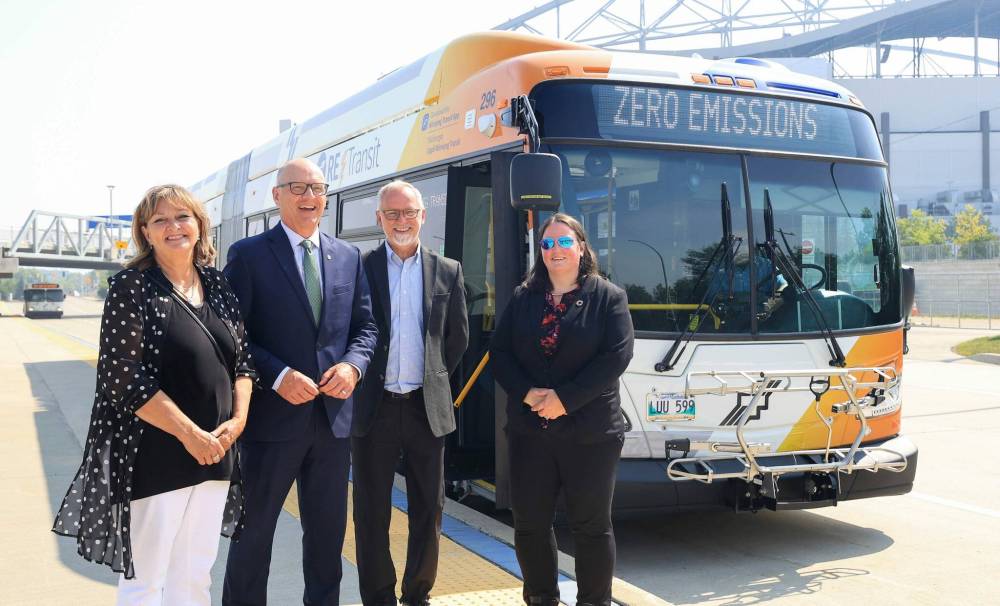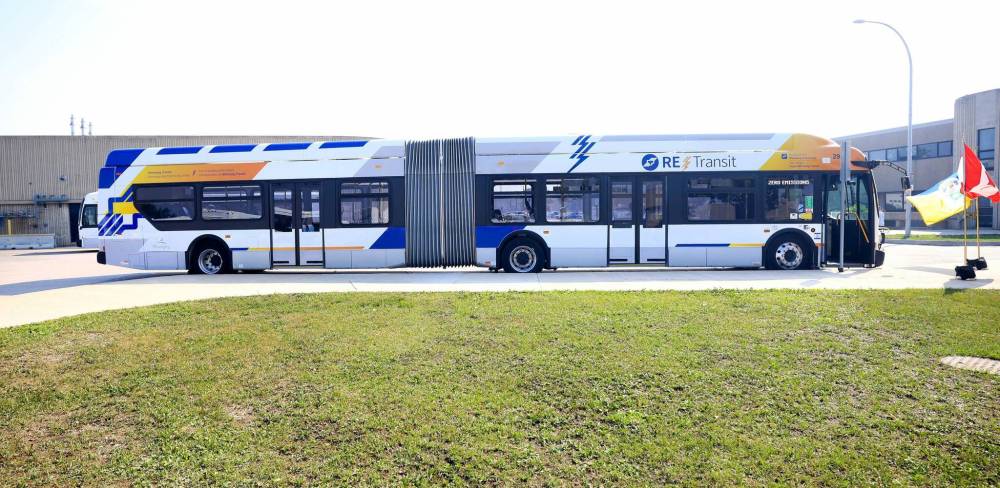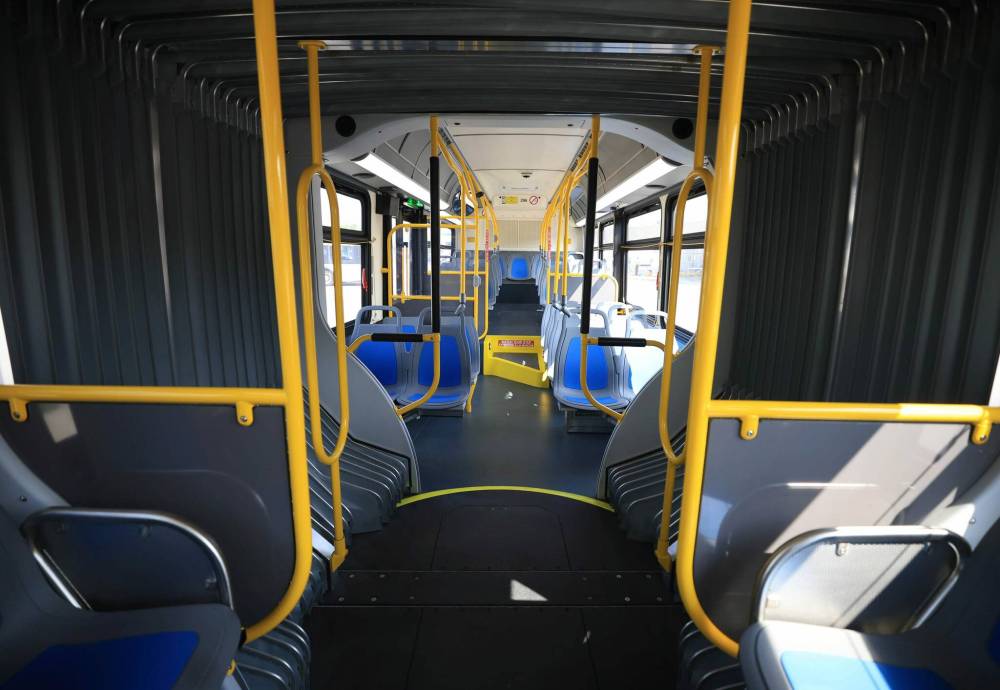Battery-electric buses finally ready to roll
Advertisement
Read this article for free:
or
Already have an account? Log in here »
To continue reading, please subscribe:
Monthly Digital Subscription
$0 for the first 4 weeks*
- Enjoy unlimited reading on winnipegfreepress.com
- Read the E-Edition, our digital replica newspaper
- Access News Break, our award-winning app
- Play interactive puzzles
*No charge for 4 weeks then price increases to the regular rate of $19.00 plus GST every four weeks. Offer available to new and qualified returning subscribers only. Cancel any time.
Monthly Digital Subscription
$4.75/week*
- Enjoy unlimited reading on winnipegfreepress.com
- Read the E-Edition, our digital replica newspaper
- Access News Break, our award-winning app
- Play interactive puzzles
*Billed as $19 plus GST every four weeks. Cancel any time.
To continue reading, please subscribe:
Add Free Press access to your Brandon Sun subscription for only an additional
$1 for the first 4 weeks*
*Your next subscription payment will increase by $1.00 and you will be charged $16.99 plus GST for four weeks. After four weeks, your payment will increase to $23.99 plus GST every four weeks.
Read unlimited articles for free today:
or
Already have an account? Log in here »
Roughly six months after the city unveiled its first zero-emission bus, Winnipeggers will finally be able to start riding one.
Winnipeg Transit announced Thursday its first 60-foot (18-metre) battery-electric bus will go into “limited service” next week.
The service received its first hydrogen fuel-cell battery-electric bus in February and initially expected to have some zero-emission buses operating in April. It now has eight fuel-cell battery-electric buses and eight battery-electric ones.

Ruth Bonneville / Free Press
(From left to right) Councillor Janice Lukes, chairwoman of council’s public works committee, Mayor Scott Gillingham, Greg Ewankiw director, Transit and Erin Cooke, project manager for Transit’s zero emission Bus program, stand next to Winnipeg’s first 60-foot battery-electric bus.
None of the zero-emission vehicles have served local routes yet, Erin Cooke — project manager for Transit’s transition to a zero-emission program — said.
“We only have one room in our facility that’s been retrofitted to do service and maintenance on … fuel cell buses,” she said. “So, we can only basically work on them one at a time.”
Cooke said the large number of buses Winnipeg Transit has received in the last year has put a lot of strain on its system.
“We’re used to getting 30 buses a year. We’ve received 105 buses in the last six months or so,” she said.
Cooke said it took extra time to get buses ready for service, which includes preparing fare boxes and radios, as well as training staff members. Charging infrastructure for electric buses and hydrogen fuelling options were already in place.
The hydrogen fuel cell buses can drive up to 24 hours without refuelling, while the battery electric ones can drive for 10 to 15 hours without recharging.
Cooke said Thursday a total of six green buses are “ready to hit the streets.”
“We should be seeing the remainder of the buses, within the next two weeks or so, starting to get into limited service,” she said.

Ruth Bonneville / Free Press
Another 24 zero-emission buses are expected to arrive in early 2026.
A news release notes the initial limited service period for zero-emission buses will last 30 days. During that time, they will run only weekdays during the peak morning and early afternoon rush hours.
Cooke said easing the buses into broader service will allow the city to test the vehicles and address any bumps along the way.
“We want to make sure that we’re operating them in hours that we have technicians on site, ready to go and respond if there’s any problems,” she said.
The bus unveiled Thursday will be the first 18-metre battery electric bus to operate in a Canadian city’s fleet, Winnipeg Transit said.
“We are proud to be leading the charge … when it comes to sustainable transportation in the country,” Coun. Janice Lukes (Waverley West), chairwoman of council’s public works committee, said.
Another 24 zero-emission buses are expected to arrive in early 2026.
Overall, Winnipeg Transit is slated to receive 90 zero-emission buses as part of a $280-million funding agreement between the city, province and Ottawa.
A member of Parliament said the investment is key to reducing air pollution.

Ruth Bonneville / Free Press
Bus driver, Allen Fifer, who has worked as a transit driver for 45 years, is all smiles as he prepares to take Mayor Scott Gillingham and others for a ride-along on Winnipeg’s first 60-foot battery-electric bus.
“All summer long, this has been the worst recorded air quality in the history of the City of Winnipeg (because of forest fire smoke). We all … have a responsibility to do our part to contribute towards the combating of climate change. This is a wonderful example of how we’re doing that at the local level,” Ben Carr, MP for Winnipeg South Centre, said.
Transit has been slow to add green buses to its fleet so far, after first testing out four leased electric buses in a pilot project from 2015 to 2018.
City council voted earlier this year to return to buying only diesel buses after its tri-government funding deal wraps up.
When asked if that decision will prevent the city from reaching its goal to switch the entire Winnipeg Transit fleet to zero-emission models by 2045, Mayor Scott Gillingham said new senior government funding could still make that possible.
“The cost of the zero-emission buses is substantially more than a diesel bus … So, we as a city, would need assistance from the federal and provincial governments to be partners once again … to procure more zero-emission buses in the future,” he said.
Cooke said earlier this year that a 12-metre diesel bus cost around $900,000, while the city will pay about $1.56 million for each electric bus of the same size and $1.9 million per fuel-cell version.
Winnipeg Transit now has about 640 buses, its website states.
The chairperson of the city’s climate action and resilience committee said he’s concerned green buses and other environmental initiatives aren’t being deemed as urgent as other city priorities.

Ruth Bonneville / Free Press
The hydrogen fuel cell buses can drive up to 24 hours without refuelling, while the battery electric ones can drive for 10 to 15 hours without recharging.
“It does seem to be a frustrating pattern here, that we don’t seem to be able to get these environmental initiatives up and running,” Coun. Brian Mayes (St. Vital) said.
As an example, Mayes noted the city now expects a long-awaited plan to convert potent landfill gases into renewable energy, if council approves it, won’t be implemented until at least 2028, instead of a previous 2026 target.
“I’d like to see some more priority (given to environmental projects) or at least, let’s pick up the pace.”
joyanne.pursaga@freepress.mb.ca
X: @joyanne_pursaga

Joyanne is city hall reporter for the Winnipeg Free Press. A reporter since 2004, she began covering politics exclusively in 2012, writing on city hall and the Manitoba Legislature for the Winnipeg Sun before joining the Free Press in early 2020. Read more about Joyanne.
Every piece of reporting Joyanne produces is reviewed by an editing team before it is posted online or published in print — part of the Free Press‘s tradition, since 1872, of producing reliable independent journalism. Read more about Free Press’s history and mandate, and learn how our newsroom operates.
Our newsroom depends on a growing audience of readers to power our journalism. If you are not a paid reader, please consider becoming a subscriber.
Our newsroom depends on its audience of readers to power our journalism. Thank you for your support.

